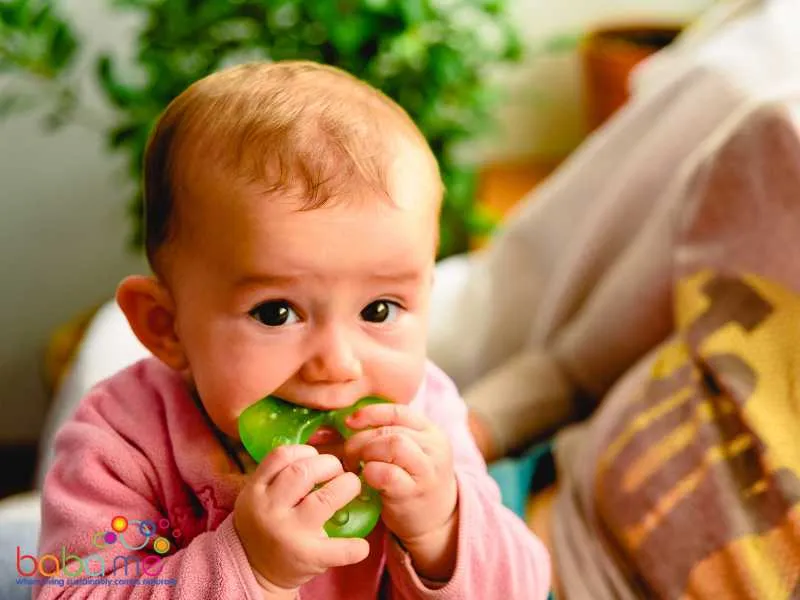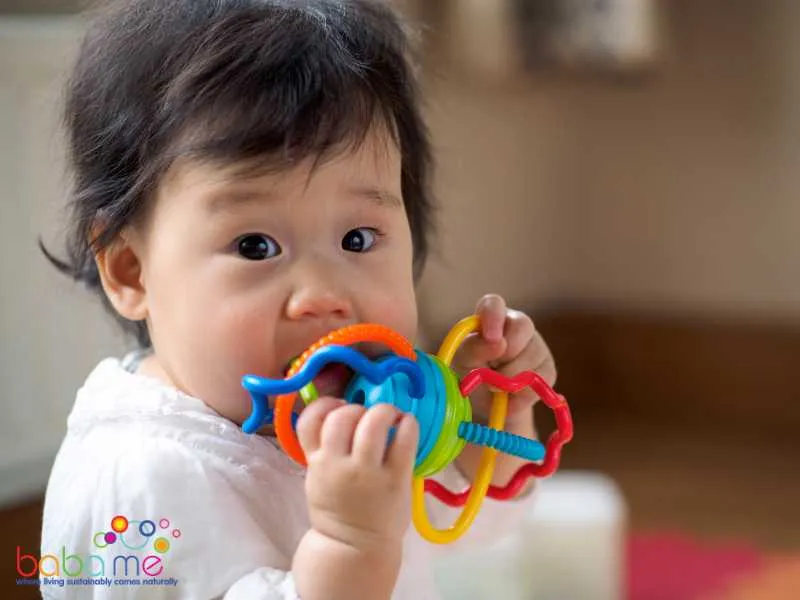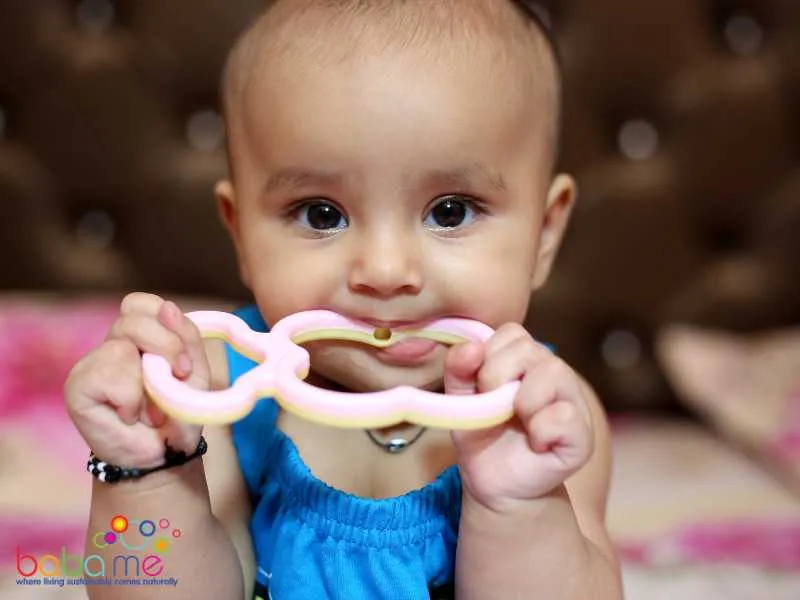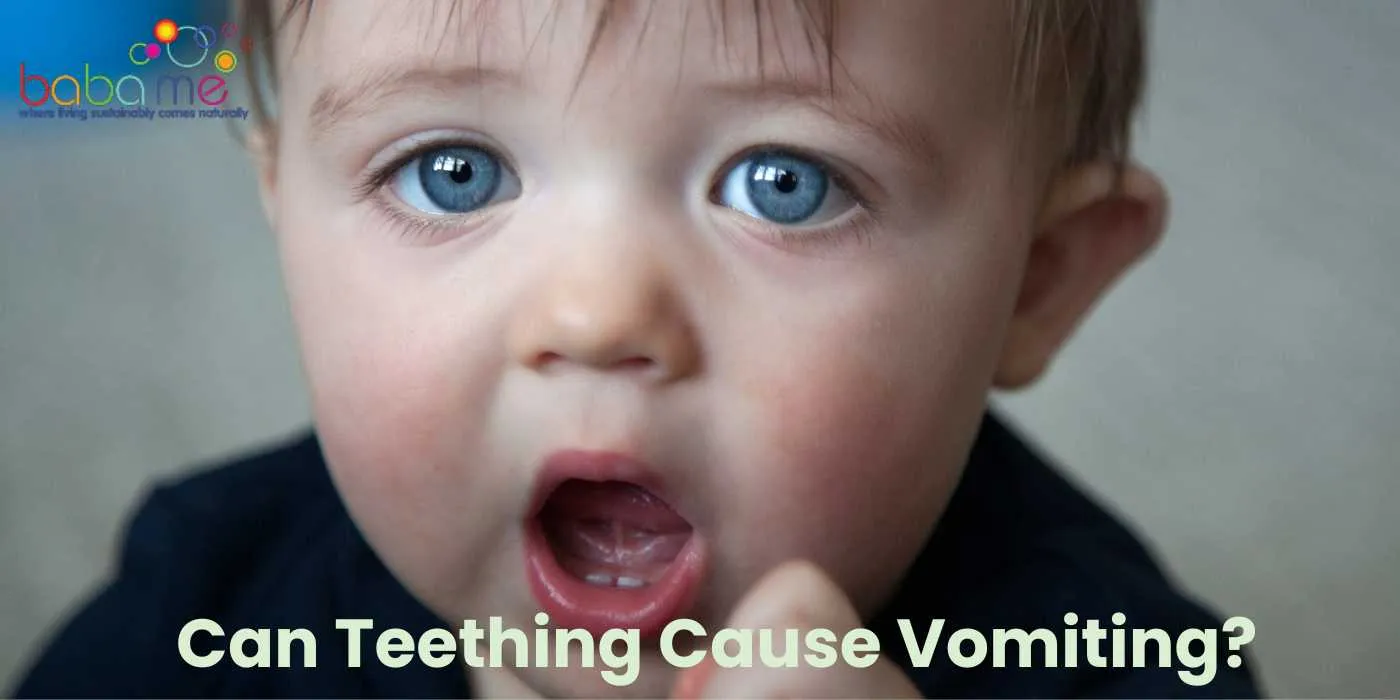Teething is a natural process that all babies go through, usually starting around six months of age. It can be a difficult time for both the baby and the parents, as it can cause pain, irritability, and loss of appetite. However, some parents may also notice their baby vomiting during this time, which can be concerning and lead to questions about whether teething can cause vomiting.
While some parents may attribute their baby’s vomiting to teething, there is no clear evidence that teething directly causes vomiting. Teething does not cause generalized symptoms such as vomiting, fever, rash, and diarrhea. However, it is possible that a baby may experience vomiting during the teething process due to other factors, such as an upset stomach or a viral illness.
Let’s dive in and sort fact from fiction!
Teething Symptoms
Teething symptoms can vary among babies, but there are some common signs you might notice when your child is getting a new tooth. Here are some typical symptoms associated with teething:
Drooling: Teething stimulates drooling, and it’s not uncommon for babies to drool more around the time new teeth are coming in.
Chewing, Biting, and Sucking: Babies might try to reduce discomfort by chewing or biting on toys, fingers, or anything else they can get their hands on.
Irritability or Fussiness: The discomfort of teething can make your baby more irritable or fussy, especially in the days leading up to the tooth’s appearance.
Sore or Tender Gums: The area around the emerging tooth can be sensitive and tender.
Slightly Elevated Body Temperature: Teething might cause a slight increase in your baby’s body temperature. However, teething does not cause a high fever. If your baby has a high fever, you should seek medical attention.
Sleep Disturbances: Discomfort during teething can interfere with usual sleep patterns.
Decreased Appetite: Some babies might eat less than usual when they are teething.
Pulling at Ears or Cheeks: Some babies might pull at their ears or cheeks near the side of the mouth where the tooth is coming in.
Swollen or Bulging Gums: In some cases, you might even see a blueish bulge where the tooth is about to break through.

Is Vomiting A Sign of Teething?
One of the most common symptoms that parents report during teething is vomiting. However, there is no proven link between teething and vomiting. While some babies may experience vomiting during teething, it is usually caused by other factors such as a stomach infection or reflux problems.
If your baby experiences vomiting during teething, it is important to monitor their behavior and symptoms. If the vomiting persists or is accompanied by other symptoms such as a fever or diarrhea (teething does not cause diarrhea), it may be a sign of an underlying medical condition.
It is important to note that not all babies experience vomiting during teething and as they get older they tend to suffer fewer and milder symptoms.
Causes of Vomiting during Teething
Teething is a natural process that can cause some discomfort in babies. While some parents may report vomiting as a symptom of teething, there is no proven link between the two. However, there are some possible causes of vomiting during teething that parents should be aware of.
Increased Saliva Production
During teething, babies may produce more saliva than usual. This can cause them to drool excessively, which can lead to vomiting if they swallow too much saliva. The excess saliva can also cause them to gag, which can trigger vomiting.
Swallowing of Excess Saliva
Babies may also swallow air along with the excess saliva they produce during teething. This can cause them to feel bloated and uncomfortable, leading to vomiting. Additionally, babies may swallow objects, such as toys or fingers, to relieve the discomfort of teething. This can also cause vomiting if the object is too large or if the baby swallows it improperly.
Gastrointestinal Disturbances
Teething can cause gastrointestinal disturbances, such as acid reflux or constipation, which can lead to vomiting. The discomfort caused by teething can also make babies more fussy and irritable, which can lead to a decreased appetite and subsequently vomiting.

When to Seek Medical Attention
While teething can cause some discomfort and irritability in babies, it is generally not a cause for concern. However, if your baby is experiencing vomiting, it is important to monitor their symptoms and seek medical attention if necessary, esepcially if they present with more severe symptoms. Here are some signs that you should seek medical attention:
Persistent temperatures over 101°F (38.3°C)
Refusal to drink
Frequent vomiting
Wheezing or labored breathing
Rash associated with a fever
If your baby’s temperature remains below 100.4°F (38°C) and they have other classic symptoms of teething such as drooling, irritability, and gum irritation, it is likely that they are simply experiencing the normal discomfort associated with teething. However, if you are unsure or concerned about your baby’s symptoms, it is always best to consult with your family doctor or pediatrician.
If your baby’s vomiting is accompanied by other warning signs such as chest pain, severe abdominal pain or cramping, blurred vision, confusion, agitation breathing difficulties difficulty, high fever and stiff neck, fecal material or fecal odor in the vomit, or rectal bleeding, refusal of liquids severe irritability shortness, it is important to seek immediate medical attention by calling 911 or emergency medical assistance.

Home Remedies for Vomiting during Teething
While vomiting during teething is generally not a cause for concern, it can be uncomfortable for your baby. Here are some home remedies to treat teething babies that may help alleviate the symptoms:
Cold food: Try giving your baby refrigerated items like applesauce, yogurt, and cold fruit (if they’re old enough for solids).
Frozen cloth: Wet and chill a cloth in the freezer. Then, give it to your baby to chew on. The cold temperature may help soothe their gums and alleviate vomiting.
Rubbing or massaging your baby’s gums: You can use a clean finger or some wet gauze to gently massage your baby’s gums. With this method, the pressure may help alleviate the discomfort and vomiting.
Hydration: Make sure your baby stays hydrated. Offer them water or breast milk frequently. Dehydration can worsen vomiting and other symptoms.
Rest: Make sure your baby gets plenty of rest during this time. Rest may help alleviate the symptoms and speed up the healing process.
Teething ring: teething rings and teethers are great at soothing sore gums, you can get ones which are chilled (but never freeze teething rings) and yes wooden teethers are perfectly safe.
Topical pain relievers such as teething gel (just put on swollen gums parents) or even general child pain relievers will help alleviate symptoms (this can be a simple otc pain reliever).
Best Overall
HABA Magica
- Ultimate Quality
- Multiple layers of water-based, solvent-free lacquers make it extremely resistant to wear and tear
- Easy to grasp for young children’s hands
Best Silicone / Wood
Arudyo Teether
Silicone and natural beech materials
The hollow design and lightweight size make it easy for babies to grasp and use for teething and grasping training.
Best value
Teether Toys 4pk
- Made from natural untreated unsealed beech wood
- Supports baby’s early motor skill development
FAQS on Can Teething Cause vomiting
Can teething cause an upset stomach?
Teething itself does not typically cause an upset stomach. However, excessive drooling and swallowing more saliva than usual during teething can lead to an upset stomach in some babies.
Can teething cause vomiting or diarrhea?
Teething is not a direct cause of vomiting or diarrhea. However, increased saliva production and swallowing more saliva than usual during teething may lead to an upset stomach and looser stools in some babies.
What is the cause of baby vomiting?
Baby vomiting can be caused by various factors, including gastroesophageal reflux, stomach infections, food allergies, overfeeding, motion sickness, or an obstruction in the digestive tract. If your baby frequently vomits or has other concerning symptoms, consult your pediatrician.
What are the symptoms of baby teething sickness?
Teething sickness is not a specific medical condition, but babies experiencing teething may show symptoms such as irritability, drooling, gum swelling, difficulty sleeping, loss of appetite, and a mild fever. If your baby has severe or persistent symptoms accompany vomiting, consult your pediatrician.
What are 5 common signs of babies when they are teething?
Five common signs of teething in babies include:
Irritability or fussiness
Excessive drooling
Swollen or tender gums
Gnawing or chewing on objects
Mild fever
How long does teething sickness last?
Teething symptoms usually last for a few days to a week as each tooth emerges. However, since babies get multiple teeth over a period of months, teething symptoms may come and go throughout the process.
Why is my baby throwing up?
Babies may throw up due to various reasons, including overfeeding, gastroesophageal reflux, stomach infection or food allergy, motion sickness or bacterial or viral infection. If your baby frequently vomits or has other concerning symptoms, consult your pediatrician.
Do babies get upset stomachs when teething?
While teething itself does not typically cause upset stomachs, some babies may experience an upset stomach due to excessive drooling and swallowing more saliva than usual during teething. If your baby has persistent or severe stomach issues, consult your pediatrician.







